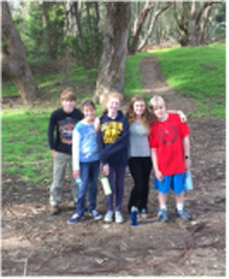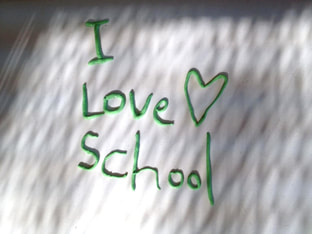
- Provides a supportive and safe environment in which each student is honored as the whole child, is challenged to grow, take risks, fail forward, and persevere.
- Creates a community where children learn to cooperate, work together, and interact fairly.
- Instills confidence, self-discipline, and respect for hard work.
- Delivers learning experiences that demonstrate direct correlations between effort and achievement, personal improvement and goal setting, and the importance of commitment and responsibility.
- Delivers immediate and direct feedback for personal and academic growth.
- My City School student to teacher ratio is 4:1 for core subjects.
- MCS teaches each child to their capacity, so they can realize and see their full potential.
- MCS teaches through each child’s strengths, develops a students’ individual learning style and begins to remove the stigma around learning differently often built up from traditional educational environments.
- Instructors and students, discover each child’s personal themes to understand their motivational factors in order to create a hunger and curiosity for learning.
- Individualized profiles are created at the beginning of each year, to track the whole child growth.
- Executive Functioning Skills are incorporated into daily routines to develop each child’s planning, organizational, getting started and completion skills in preparation for high school.
- At MCS we introduce subjects through discovery. Students learn through experiential learning 1-2 times per week outside the classroom in our extended learning laboratories.
- We integrate topics across all subjects of Science, Math, History, Art and Language Arts to maintain the commitment of teaching for true understanding and real life application.
- Our extended days provide the time for concepts to have a unique hands on experience connected to it. This experience of learning in a multi sensory way deepens understanding and sets the foundation for peer support, to further strengthen learning.
- Student academic progress is tracked based on individual skill level. Instructors and parent’s partner on student priorities for the year, and create a plan for the Summer months to ensure pacing meets high school readiness.
- We approach The Whole Child First. At My City School, we understand students need to be emotionally grounded in order to maximize every learning opportunity. We bring out the confidence in our learners by teaching through their strengths and motivational factors while supporting the exploration and building of their opportunities.
- At My City School we teach critical thinking and logic in all subjects. We created discussion models from Common Core, NGSS and Visualizing and Vocalizing to thoughtfully guide students through thinking approaches and discussion techniques in Literature, History, Science and Art.
- An important foundation to critical thinking is curiosity, which is fostered in our environment through the Socratic Method of questioning. Ultimately, creating a bridge to the independent learner we see in all our students
What is special about the teaching methods My City School utilizes to teach to capacity?
MCS utilizes remediation techniques, while focusing on learning and understanding, which support our students. Remediation supports the foundational building blocks of where the breakdown in learning is happening. This approach creates a consistent ‘one track of learning’ vs. receiving remediation outside the classroom, then returning to the classroom which uses different strategies.*
*Please note: Although remediation techniques are used in the classroom for teaching and support, this does not replace the need for one-to-one remediation students may need outside of the classroom to develop underlying skills, such as in reading, spelling, and comprehension.
*Please note: Although remediation techniques are used in the classroom for teaching and support, this does not replace the need for one-to-one remediation students may need outside of the classroom to develop underlying skills, such as in reading, spelling, and comprehension.
What is the difference between Remediation vs. Tutoring?
Remediation and Tutoring typically serve different purposes, and can be equally important. If a student has learning differences, it’s important to support a child with remediation so they can develop the neural networks that ultimately lead to a child becoming an independent learner. Along this journey, (which can last Kindergarten-College) tutoring is often critical to ensure content can be understood and academic progress is achieved.
- Remediation is intensive intervention, delivered by a specialists, often taking information from formal and informal assessment of academic skills, and utilizing specific, alternative teaching strategies, to build up skill sets that directly impact the ability to learn independently. Remediation focus on closing the gaps that are pre-existing. It is not a 'remedial' class.
- Tutoring provides assistance with homework and teaches children requiring private instruction in specific subject matter, focusing on academic goals from the school curriculum.
What learning differences do we see and support in our classroom?
While each child has a unique profile, we have students that have a variety of diagnosed and undiagnosed learning differences. In our environment we find our students internalize learning best through multi-sensory, or kinesthetic learning. It is common for our students to have ADHD/ADD, Dysgraphia, Dyscalculia, Auditory and general Processing deficits, Visual and Spatial deficits, Memory Recall challenges, Fine Motor skill deficits, comprehension issues, and expressive language challenges.
Our Students Learn:

- To develop an understanding of their unique way of learning and thinking.
- To build self-esteem and develop the needed skills to become self-advocates, in order to grow and maintain their love of learning.
- To appreciate individual differences of members in their learning community.
- To demonstrate a passion for learning, develop self confidence and the skills needed for high school.
- To make good choices and act responsibly.
- To be responsible, socially competent citizens who participate actively:
To build trust and be honest
To engage and embrace diversity
To be accountable
To strive to learn
To work hard and have fun

